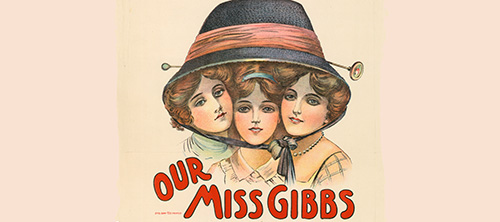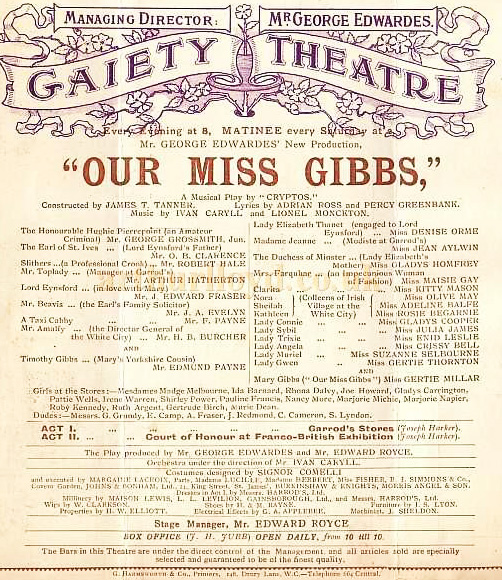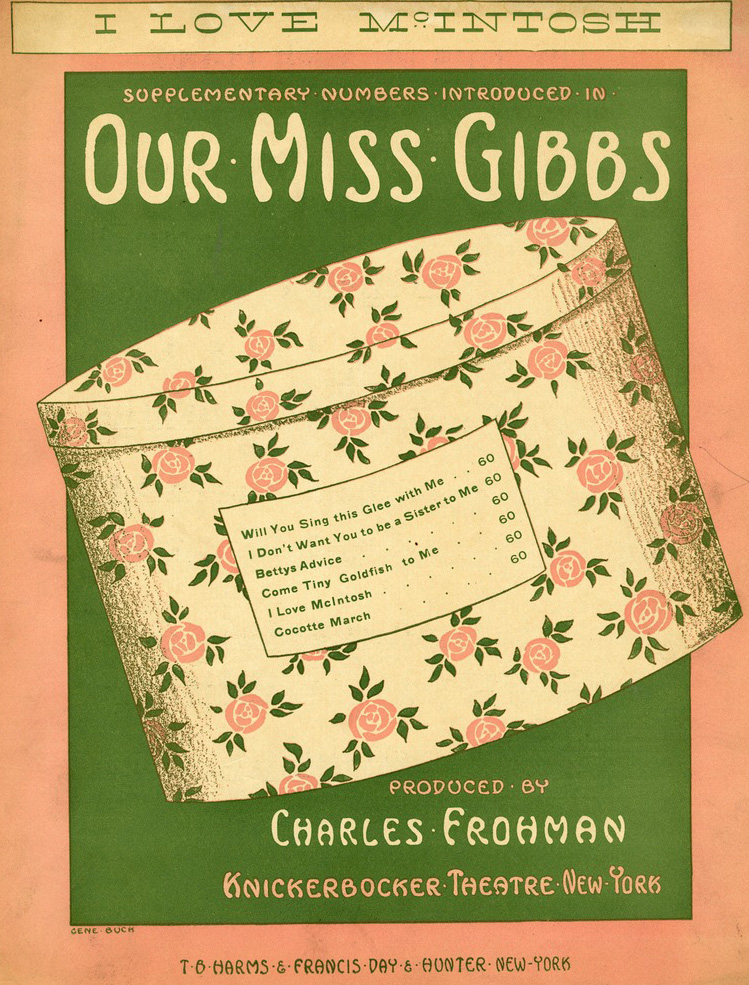
Mary Gibbs, a Yorkshire Lass, works in the flower department of Garrod’s Department Store. Her heart belongs to the bank clerk Harry Lancaster (who is really Lord Eynsford in disguise). Lord Eynsford is engaged to Lady Elizabeth Thanet, but she much prefers Hughie Pierrepoint, an amateur criminal. When Mary discovers Lord Eynsford’s deception, she leaves her job and goes off to the Franco-British Exhibition at White City. Lord Eynsford follows her, proves his honourable intentions, and all gets sorted out happily.
Act I
Mary Gibbs is a Yorkshire lass who, in 1908, has found work at Garrods in London as a shop girl, selling candy. The young men are making themselves ill eating the sweets they buy to gain the attention of the beautiful, but no-nonsense Mary, who disapproves of their attempts at familiarity. Miss Gibbs has fallen in love with a young bank clerk who is actually the son of an Earl, Lord Eynsford, in disguise. His father would not consent to his marrying a shop girl. When she discovers that young Eynsford has lied to her, she breaks up with him.
Mary's cousin Timothy travels from Yorkshire to play in the town band for a contest at the Crystal Palace. He is a very unsophisticated country boy, and he has a variety of humorous big city adventures. Timothy gets entangled in a crime by mistakenly picking up a bag. Inside the bag is the Ascot Gold Cup (the trophy for Britain’s most prestigious long-distance horse race). The cup has just been stolen by the Hon. Hughie Pierrepoint.
Act II
At the Franco-British Exhibition in White City, Timothy worries that the police will find him and accuse him of the crime. He disguises himself as a contestant in the Olympic marathon race. When he staggers into the stadium, he is mistakenly declared to be the winner. The Gold Cup is eventually recovered and returned to its owner, who is coincidentally Lord Eynsford. He is now so enchanted with Mary that he is eager for her to become his daughter-in-law, and all ends happily.
Originally staged at the Gaiety Theatre in January 1909, it ran for 636 performances, and was a great success for Gertie Millar – especially her hit song “Moonstruck”, written by her husband, Lionel Monckton. Despite its huge London success, the Broadway production only managed 64 performances in August 1910.
Produced by George Edwardes, it opened at the Gaiety Theatre in London on 23 January 1909 and ran for an extremely successful 636 performances. It starred Gertie Millar, Edmund Payne and George Grossmith, Jr. The young Gladys Cooper played the small role of Lady Connie.
The show also had a short Broadway run in 1910. It was revived at the Finborough Theatre, London, in May 2006. This was the first professional London production since 1910. The piece was regularly revived by amateur theatre groups, particularly in Britain, from the 1920s into the 1950s but it has been produced only rarely since then. Our Miss Gibbs was revived by Lyric Theatre in July and August 2011 at the Mountain View Center for the Performing Arts and the Lesher Center for the Arts in Walnut Creek, California. The revival featured a cast of 22 and a 9-piece orchestra.
Act I - Garrod's Stores
No. 1 - Chorus - "We'll be quick and do our shopping..."
No. 2 - Eynsford - "There's a girl at the stores called Mary..."
No. 3 - Bridesmaids - "We're the dear little ladies, selected..."
No. 4 - Jeanne and Chorus of Girls - "Some people say success is won..."
No. 5 - Betty - "Though I am not so unwilling..."
No. 6 - Dudes - "A fashionable band of brothers are we..."
No. 7 - Mary and Chorus of Dudes - "I'm a little Yorkshire lass..."
No. 8 - Hughie and Chorus - "Though I'm a man of noble birth..."
No. 9 - Mary and Timothy - "When the season's on the wane..."
No. 10 - Mary and Hughie - "I will confess that as a man..."
No. 11 - Concerted Number - "There's a City of palaces white..."
No. 12 - Finale - Act I - "Saturday afternoon..."
Act II - Court of Honour at the Franco-British Exhibition
No. 13 - Chorus and Entrance of Irish Girls - "Palaces oriental..."
No. 14 - Mary - "Oh, London is really a wonderful town..."
No. 15 - Hughie, Toplady, Slithers, Amalfy, Eynsford and Timothy - "Though something has upset me..."
No. 16 - Betty and Chorus - "I am sure your education is not complete..."
No. 17 - Concerted Number - "Push the pram for baby..."
No. 18 - Mary and Timothy - "I'd like to tell you all about the farm..."
No. 19 - Chorus and Solo Dance - "Over the dome and steeple..."
No. 20 - Mary (dressed as Pierrot) and Chorus of Girls - "Moon, moon, mischief making moon..."
No. 21 - Hughie and Timothy - "If you'll come down to my place..."
No. 22 - Finale - Act II - "When country cousins come up to town..."
Aucun dossier informatif complémentaire concernant Our Miss Gibbs
Aucun dossier informatif complémentaire concernant Our Miss Gibbs

Version 1
Our Miss Gibbs (1909-01-Gaiety Theatre-London)
Type de série: OriginalThéâtre: Gaiety Theatre (Londres - Angleterre) Durée : 1 an 10 mois 2 semaines Nombre : 636 représentationsPremière Preview : Inconnu
Première: 23 January 1909
Dernière: 03 December 1910Mise en scène : Edward Royce • Chorégraphie : Producteur : Star(s) : Avec: Gertie Millar (Mary Gibbs), George Grossmith (Hon. Hughie Pierrepoint), Robert Hale (Slithers), J. Edward Fraser (Lord Eynsford), Edmund Payne (Timothy Gibbs), Denise Orme (Lady Elizabeth Thanet), Maisie Gay (Mrs Farquhar)

Version 2
Our Miss Gibbs (1910-08-Knickerbocker Theatre-Broadway)
Type de série: Original BroadwayThéâtre: Knickerbocker Theatre (Broadway - Etats-Unis) Durée : 1 mois 3 semaines Nombre : 57 représentationsPremière Preview : Inconnu
Première: 29 August 1910
Dernière: 22 October 1910Mise en scène : Chorégraphie : Producteur : Star(s) :
Pas encore de video disponible pour ce spectacle